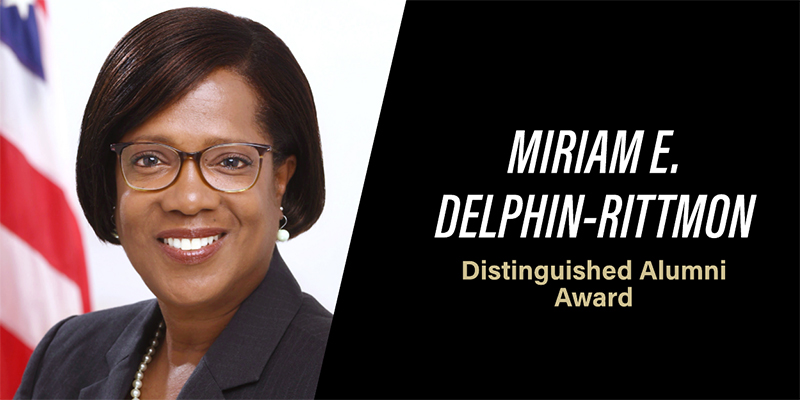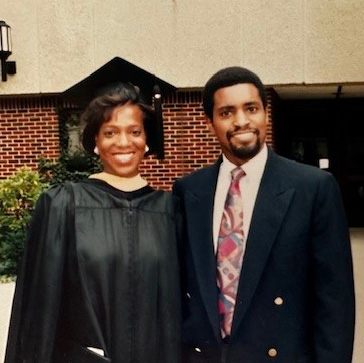Purdue HHS Distinguished Alumna shapes mental health, substance abuse policy through career in public service
Written By: Rebecca Hoffa, rhoffa@purdue.edu

Suicide is one of the leading causes of death in the United States, according to the Centers for Disease Control and Prevention. This is a statistic that Miriam Delphin-Rittmon, a two-time Purdue University Department of Psychological Sciences alumna, is working to change.
As assistant secretary for mental health and substance use in the U.S. Department of Health and Human Services and the administrator of the Substance Abuse and Mental Health Services Administration (SAMHSA), one of Delphin-Rittmon’s proudest achievements in her role in leading the nation’s transition to the three-digit 988 National Suicide and Crisis Lifeline, which launched in July 2022.
“In just under two years since the start of 988, 9.1 million people have reached out via call, text or chat to get help,” Delphin-Rittmon said. “That in its own way is bittersweet. It means people are struggling, but what I appreciate is that people are reaching out to get help. People don’t have to struggle alone. Help is available and recovery is possible.”
Delphin-Rittmon is being recognized with the 2024 Distinguished Alumni Award from Purdue’s College of Health and Human Sciences for her significant accomplishments and leadership across academia as well as state and federal governments.
“It is truly an honor,” said Delphin-Rittmon, who earned her master’s degree and PhD from Purdue in 1992 and 2001, respectively. “I’m grateful for my time at Purdue because I think it helped to shape my career in significant ways, and day-to-day, I use many of the skills I learned from Purdue in my work. We often don’t pause to think about our role or our impact, and so I’m grateful for the opportunity to look back over my career and think about the impact of Purdue on my career up to this moment.”
While Delphin-Rittmon has had an extensive career focused on addressing mental health and substance use disorders, from serving for 20 years on the faculty in Yale University’s Department of Psychiatry to holding a variety of leadership roles in the Connecticut Department of Mental Health and Addiction Services, SAMHSA has remained a connecting thread through it all. Delphin-Rittmon started as a fellow in the SAMHSA Minority Fellowship Program in 1990, participated in a technical expert panel addressing homelessness in 2004, served as a consultant on the Shared Decision Making: Making Recovery Real Project in 2007, and in 2012 was invited back as a White House appointee serving as a senior advisor to the administrator of SAMHSA for the Obama administration, taking a two-year leave from Yale.
Delphin-Rittmon was in her sixth year as commissioner of the Connecticut Department of Mental Health and Addiction Services when she was approached in 2021 about being nominated by President Joe Biden to serve as assistant secretary of mental health and substance use in the U.S. Department of Health and Human Services and the administrator of SAMHSA. Her answer was “Yes, absolutely.”
“At that time, we were in the midst of COVID-19, and the country was struggling in terms of behavioral health,” Delphin-Rittmon said. “It was an important moment, we were seeing increased rates of anxiety, depression and opioid overdoses, and SAMHSA was also in a place of rebuilding. So this felt like a full circle moment and an opportunity to make a difference when the country was experiencing collective trauma as a function of the pandemic.”
In her current role, Delphin-Rittmon oversees a $7.3 billion budget administering a broad range of prevention, treatment and recovery related grants. In addition, she develops and implements policies designed to improve behavioral health services, systems and outcomes from implementing President Biden’s Unity Agenda to making significant advances in suicide prevention.
“I’ve loved working in public service spaces, whether it’s state or federal government,” Delphin-Rittmon said. “Meeting with people and hearing directly from community members, our grantees or even other collaborating government departments — I think it’s so important to get input from people the policy or program is intended to serve. It’s one way we carry out the recovery advocacy mantra ‘Nothing about us without us.’”
In addition to its impact on her career, Delphin-Rittmon ended up attending Purdue thanks to the SAMHSA Minority Fellowship Program. After working in case management in New York City for a year after graduating with her bachelor’s degree in psychology from Hofstra University, Delphin-Rittmon was inspired to apply for the fellowship program. After receiving it, she was recommended three graduate school options, one of which was Purdue.

Miriam Delphin-Rittmon (left) poses with David Rollock (right), 150th Anniversary Professor in the Department of Psychological Sciences.(Photo provided)
“I called Purdue, and I talked to David Rollock, and I decided right after that conversation that I wanted to go to Purdue,” Delphin-Rittmon said. “David Rollock told me about the research he was doing within his lab looking at multicultural issues in psychology, looking at student help-seeking behavior, racial identity and doing student survey research. It just seemed exciting because it was not an area I was steeped in, but after doing case management work in New York City and seeing many challenges with disparities and the ways in which culture is important in care, I decided that Purdue and being part of David Rollock’s lab would be a wonderful place to study.”
At Purdue, Delphin-Rittmon was not only involved in Rollock’s lab but also served as a graduate assistant in what was then Purdue’s Office of Diversity and Multicultural Affairs in the Office of Human Relations, where she served on and later became coordinator of the DiversiTeam, which offered diversity training on campus and in the community.
These opportunities were influential in Delphin-Rittmon’s later career when she became director of cultural competence research and consultation for the Yale Program for Recovery and Community Health in the Department of Psychiatry and director in the Office of Multicultural Affairs in the Connecticut Department of Mental Health and Addiction Services commissioner’s office.
As Delphin-Rittmon reflects on her career, she noted her gratitude for the career informing experiences as well as knowledge and skills she developed at Purdue.
“Purdue prepared me for my career journey because of the strong teaching, research and clinical training I received,” Delphin-Rittmon said. “It was a school that taught us to do well in all of those areas, to be crisp and sharp in terms of the research, in terms of the clinical work and in terms of teaching and all of this translates well to policy and leadership in government roles.”